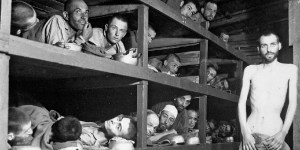Lenten Campaign 2025
This content is free of charge, as are all our articles.
Support us with a donation that is tax-deductible and enable us to continue to reach millions of readers.
Kai Höss remembers coming home from school and telling his mother about learning about the Holocaust. It was a mandatory part of German education. So was a visit to a concentration camp.
Young Kai was struck by one thing he heard in the class: the name of the so-called Commandant of Auschwitz, Rudolf Höss. He told his mother that he was surprised to learn that he and the infamous commandant shared the same name.
“That was your grandfather,” Kai’s mother revealed.
The elder Höss had built the Nazi concentration camp of Auschwitz-Birkenau and presided over the death of more than a million people. Höss tested and implemented means to accelerate Hitler's order to systematically exterminate the Jewish population of Nazi-occupied Europe. On the initiative of one of his subordinates, Höss introduced the pesticide Zyklon B to be used in gas chambers.
It must have been tough for young Kai to learn that his grandfather, whom he had never known, was responsible for one out of every six Jewish deaths during the Nazi regime. But when he picked up Höss’ autobiography at the age of 17, he said, “it broke my heart.” Höss had written Commandant of Auschwitz at the request of the Polish authorities prior to his execution after the war.
“It is the perpetrator himself giving witness to what he himself did in great detail,” Kai Höss told journalist Jonathon Van Maren. "It’s horrific when you read how he describes his work — in such a cold, clinical, calculating way.”
From atheist to Bible preacher
Kai Höss grew up to be a militant atheist and pursued wealth and pleasure. But he had a new beginning at age 28, when an operation gone wrong almost led to his bleeding to death. While recovering, he found a Gideons Bible and began reading.
“Kai was struck by Psalm 51, King David’s cry of repentance after his sin against Bathsheba and the murder of Uriah. He wondered, reading it, where his drive for wealth could lead him,” Van Maren writes. “He asked himself: If a dictator were to give him the kind of power his grandfather had possessed, could he have done what Rudolf had done?”
He continued his indulgent lifestyle, but at a party one night he met a Christian who invited him out for coffee. After months of conversation, the man invited Höss to church. Little by little, he came to accept the faith and became a Christian on Easter of 1989.
Today, married and with four children, Höss is back in Germany, a nation that works hard to make sure that such an evil as the Holocaust will never again take place, but has troublingly seen a rise in recent years of antisemitism.
Kai Höss has become pastor of the Bible Church of Stuttgart, where week after week he explains the Bible to all who want to learn.
It is the Bible, he said in the interview with Van Maren, that offers the greatest rebuke to the resurgence of antisemitism.
“God is faithful to His people,” Höss said. “I’m a Gentile and the grandson of the greatest murderer of Jewish people — and I am saved by the Jewish Messiah.”












